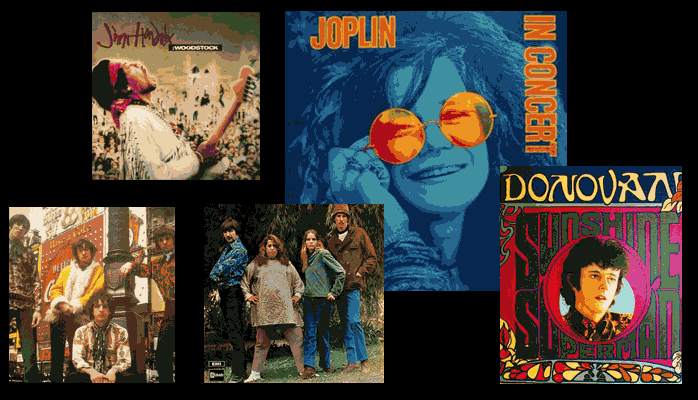Evolution
Psychedelic rock evolved in the 1960s as an offshoot of the rock and roll movement combining elements of rock, reggae, and other diverse elements. Involving the use of mind-altering drugs like cannabis, mescaline, psilocybin, and especially LSD, psychedelic rock broke with traditional rock and laid the roots for psychedelic metal and experimental rock genres. In the USA bands like the Vanilla Fudge, Grateful Dead, and Jefferson Airplane lead the way for later bands. A few years later The Who and The Beatles picked up on the psychedelic movement with tunes like "Lucy in the Sky with Diamonds" and "Sgt. Pepper's Lonely Hearts Club Band" to name a few. Although not technically classified as psychedelic rock, they were part of the mainstream popular music of that era. Cream and Pink Floyd embraced psychedelic music fully becoming two of the first truly psychedelic bands.
Psychedelia could also be interpreted as simply a "surreal and dreamy feeling" in a particular song, instead of a specific genre with rules to follow. A classic example is "Bass Strings", by Country Joe And The Fish.
Psychedelic music uses esoteric lyrics often describing dreams, visions, or hallucinations, longer songs and lengthy instrumental solos. A major feature of psychedelic music is its elaborate production, often using the latest multitrack tape recorders, and its heavy reliance on "trippy" electronic effects such as distortion, reverb, and reversed, delayed and/or phased sounds. Another common distinction is its beat variance from traditional dance music; either through an unusual encompassing beat (as heard in The Beatles' "Tomorrow Never Knows"), or by disrupting traditional 4/4 timing with interludes (as heard in Pink Floyd's "See Emily Play").
Recording and production techniques
The advent of psychedelic rock marked the emergence of the "studio as instrument" trend; studio production values rose dramatically, and musicians, engineers and producers began to explore the possibilities of recent advances in multitrack recording and electronic sound treatment, which were having a major impact on the sound of pop music. Until the mid-1960s, pop music was typically recorded quickly and simply; singles were often recorded live to tape in a single "take". This rapid development is nowhere better exemplified than by The Beatles -- their first album Please Please Me (1963) (aka Introducing...The Beatles in the US) was recorded in a single day, but their 1967 Sgt. Pepper's Lonely Hearts Club Band was the result of over 700 hours of studio sessions over a period of more than six months.
The aural character of psychedelic rock was crucially influenced by the introduction of a slew of new recording and sound processing techniques and new electronic musical instruments which became widely available in the mid-1960s. These were eagerly taken up by pop and rock musicians who were seeking ways to broaden the tonal palette of rock music.
Much psychedelic rock was performed at the Woodstock Music And Arts Festival in 1969.
Popular Bands of the Psychedelic Era


